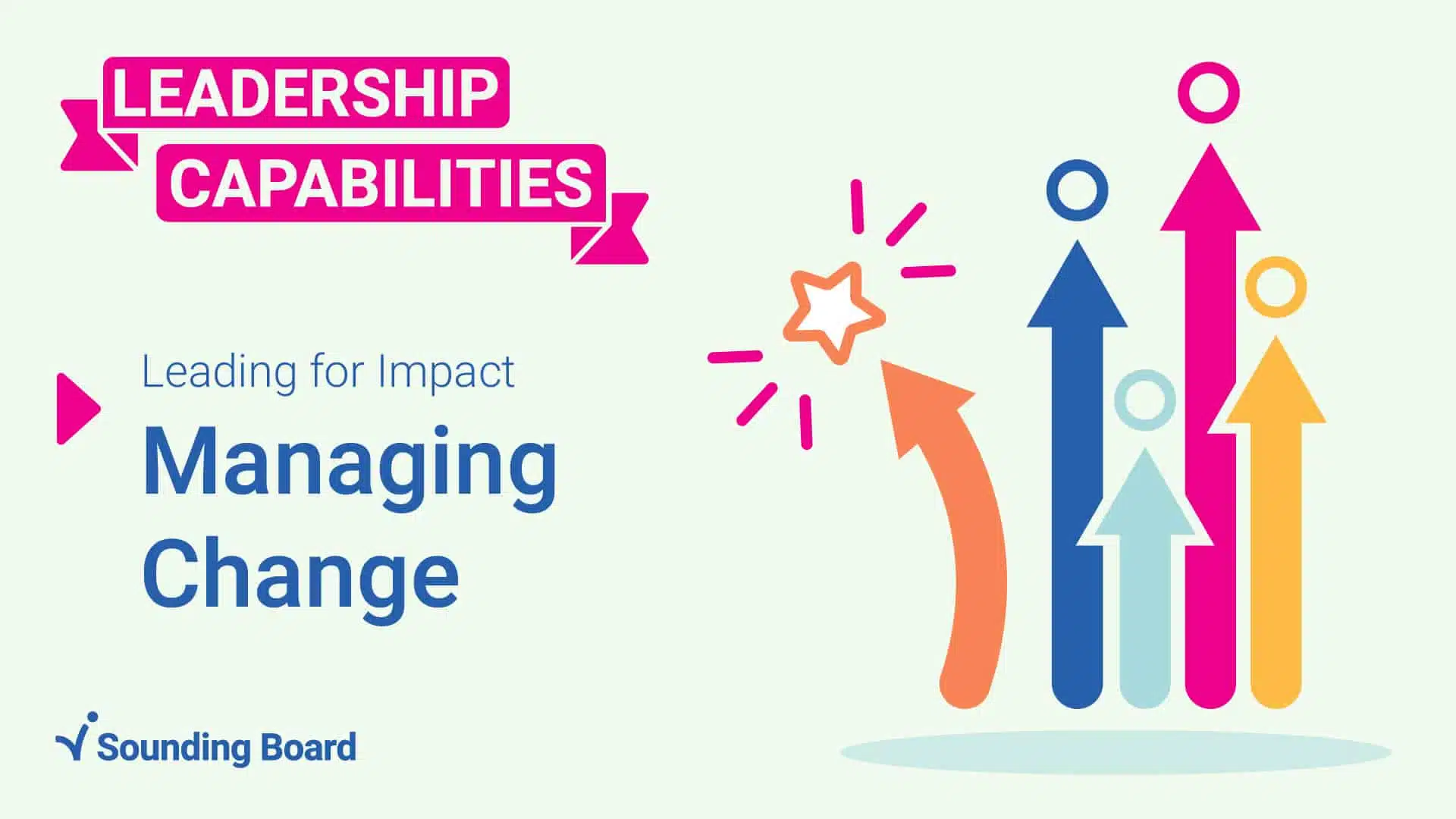This blog is part of a 16-part series focused on what capabilities make a strong leader. Sounding Board has identified 16 leadership capabilities that the strongest leaders possess. These were developed from research-backed leadership theories, leadership competencies used for evaluation from top business schools, and 25+ years of practical coaching application.
Change is a universal constant. Sometimes it’s intentional, like bringing in fresh talent or launching a new project. Other times it’s sudden, like the need to shift to a virtual workplace when a pandemic strikes. Whatever the case, managing change well is important for effective leaders who must navigate changes occurring more rapidly than has ever been seen before in business. Change management leadership skills are essential. These critical skills, or lack thereof, can make or break a function, an organization, and a leader.
What makes managing change so challenging?
Although it’s undoubtedly challenging, shepherding an organization through large or small-scale transformation is also an opportunity. The biggest barrier is often mindset. Then it may be tough for leaders to earn others’ buy-in for the change. We all have preconceived notions, opinions, and personal experiences about the way things should be done. It can be difficult to shift existing mindsets — whether they are about team members, administration, or organizational processes.
Even if a change is generally positive — like hiring someone new or expanding a new product line — it can still create uncertainty and stress for even the best workers and leaders. When the stress is negative — like a drop in profits or an unsuccessful product launch — disappointment is inevitable.
Change is also an opportunity to reassess and evolve for the better, whether you’re recovering from a setback or welcoming new team members. A failed product launch could lead to a safer, higher quality product and ultimately greater profits. A new hire may bring in much needed skills and a diverse perspective a team hasn’t yet considered. But there’s no way to know without accepting and effectively leading through change.
What is change management?
People look to leaders for guidance, and to act as a sounding board for organizational culture. They mirror the tone that leaders set, whether it’s their attitude towards changes in policy, their fellow team members, or anything in between.
Change management involves strategic planning and structural guidance in how a business prepares for and implements organizational change. For leaders to successfully navigate that change, they have to create and maintain a cohesive vision for the company — and their particular slice of it — provide clear guidance for the workforce, enforce accountability, and consistently demonstrate effective decision-making skills.
That’s not always easy. Leading change is a skill that is innate for some, not all, but it can be developed in leaders at all levels. Whether you are an executive leading managers, a manager leading employees, or an employee implementing changes that impact clients, managing change effectively will ensure that changes are met with understanding and excitement, rather than frustration.
Three essential change management skills
A successful change manager will regularly exercise three key skills:
- Communicate: Change requires vision and the appropriate communication of ideas. It’s about people as much as it is about strategy. To achieve buy-in and overcome resistance, effective change-ready leaders communicate exactly what they are trying to accomplish and how it will benefit everyone. For instance, instead of sending out sporadic announcements, you might engage employees in ongoing messaging, and actively encourage them to champion the change in their day-to-day activities.
Similarly, if you want your people to pay attention to and understand your message around a given change, listen to them. Establish a culture where they feel comfortable bringing their thoughts and ideas to you. Then solicit and incorporate their feedback and suggestions where appropriate before and after change implementation. - Be transparent: Good communication around change is transparent and leaves little room for uncertainty. For this reason, leaders must anticipate uncertainty and address it before it festers. This might mean opening up about why a change is happening, even if it’s rooted in a past mistake. Share what you hope to do differently moving forward. Often when people are given a reason for change, it’s easier to earn buy-in. It’s harder to accept new people or processes when it feels like leaders withhold or hide information.
- Simplify: It’s easy to get lost in the weeds when something new is happening. Changes can be complex, especially if their impact or scope is far reaching. To that end, it’s important to remember that no change takes place overnight. Therefore, it’s often best to tackle a change step-by-step. Simplify things by delegating tasks and taking things slowly, rather than rushing people and processes without a clear focus. A slow, more reasoned approach will also enable you to identify what is and is not working so that valuable adjustments can be made. This increases the chance the change will be fully adopted.
These are just a few of the key skills that leaders need to manage and lead through change effectively. Like all management skills, they are a muscle that can be practiced and strengthened with development. Leadership coaching is a proven learning strategy to help leaders process change more easily and then act upon them in ways that benefit their key stakeholders.
Leadership coaching can help
Developing change management skills like effective communication and active listening requires practice. These behaviors must be developed, and ideally they’ll be developed in the context of a leader’s current work priorities and concerns. Change management skills will serve leaders not only in managing change, but in all aspects of management.
At Sounding Board, we understand the diverse challenges that come with leading through constant change. That’s why our coaches are highly trained to help your leaders cultivate the skills needed to manage “new and different” effectively. That way when the next big wave of change in your organization comes, you can sail smoothly into adoption, efficiency, and profitability. Request a demo from Sounding Board today.









